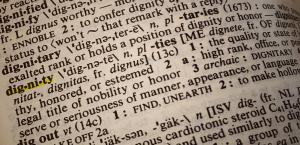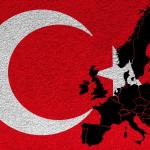On April 8, 2024, the Vatican released a much anticipated document on human dignity. Titled Dignitas Infinita, the document addresses current threats to human dignity. As a Catholic writer concerned with the topic of human dignity, this document offers much clarity in a world rife with confusion and ambiguity. Below I offer some key highlights and add my own takeaways.
From the Introduction
(Dignitas infinita) Every human person possesses an infinite dignity, inalienably grounded in his or her very being, which prevails in and beyond every circumstance, state, or situation the person may ever encounter. This principle, which is fully recognizable even by reason alone, underlies the primacy of the human person and the protection of human rights. In the light of Revelation, the Church resolutely reiterates and confirms the ontological dignity of the human person, created in the image and likeness of God and redeemed in Jesus Christ. From this truth, the Church draws the reasons for her commitment to the weak and those less endowed with power, always insisting on “the primacy of the human person and the defense of his or her dignity beyond every circumstance.”
By “ontological dignity,” the document lays out that dignity exists objectively as an integral part of the human person. This human dignity is confirmed by revealed truth declaring humans as made in God’s image and redeemed by Jesus Christ.
Threats to Human Dignity
In addressing some of the many grave violations of human dignity today, we can draw upon the teachings of the Second Vatican Council, which emphasized that “all offenses against life itself, such as murder, genocide, abortion, euthanasia, and willful suicide” must be recognized as contrary to human dignity. Furthermore, the Council affirmed that “all violations of the integrity of the human person, such as mutilation, physical and mental torture, undue psychological pressures,” also infringe upon our dignity. Finally, it denounced “all offenses against human dignity, such as subhuman living conditions, arbitrary imprisonment, deportation, slavery, prostitution, the selling of women and children, degrading working conditions where individuals are treated as mere tools for profit rather than free and responsible persons.
The Church teaches all life is sacred, from conception to natural death. Therefore, laws that violate this sacred truth violate human dignity, especially laws that allow for the active destruction of the most vulnerable of human life—the unborn and the elderly (abortion and euthanasia).
A Word on Migrants
Migrants are among the first victims of multiple forms of poverty. Not only is their dignity denied in their home countries, but also their lives are put at risk because they no longer have the means to start a family, to work, or to feed themselves. Once they have arrived in countries that should be able to accept them, “migrants are not seen as entitled like others to participate in the life of society, and it is forgotten that they possess the same intrinsic dignity as any person. […] No one will ever openly deny that they are human beings; yet in practice, by our decisions and the way we treat them, we can show that we consider them less worthy, less important, less human.” Therefore, it is urgent to remember that “every migrant is a human person who, as such, possesses fundamental, inalienable rights that must be respected by everyone and in every circumstance.” Receiving migrants is an important and meaningful way of defending “the inalienable dignity of each human person regardless of origin, race or religion.”
As a conservative Catholic, I often get mislabeled as anti-immigration. I fully support legal immigration. However, those who enter any country illegally (the legal term in the US is illegal alien), must respect the laws of said country. In this sense, any conservative Catholic can (and should) agree with the above statement.
Abortion, Surrogacy, and Euthanasia
Abortion:
But today, in many people’s consciences, the perception of its gravity has become progressively obscured. The acceptance of abortion in the popular mind, in behavior, and even in law itself is a telling sign of an extremely dangerous crisis of the moral sense, which is becoming more and more incapable of distinguishing between good and evil, even when the fundamental right to life is at stake. Given such a grave situation, we need now more than ever to have the courage to look the truth in the eye and to call things by their proper name, without yielding to convenient compromises or to the temptation of self-deception.
Surrogacy:
First and foremost, the practice of surrogacy violates the dignity of the child. Indeed, every child possesses an intangible dignity that is clearly expressed—albeit in a unique and differentiated way—at every stage of his or her life: from the moment of conception, at birth, growing up as a boy or girl, and becoming an adult.
Surrogacy also violates the dignity of the woman, whether she is coerced into it or chooses to subject herself to it freely. For, in this practice, the woman is detached from the child growing in her and becomes a mere means subservient to the arbitrary gain or desire of others. This contrasts in every way with the fundamental dignity of every human being and with each person’s right to be recognized always individually and never as an instrument for another.
Euthanasia:
Even in its sorrowful state, human life carries a dignity that must always be upheld, that can never be lost, and that calls for unconditional respect. Indeed, there are no circumstances under which human life would cease from being dignified and could, as a result, be put to an end: “Each life has the same value and dignity for everyone: the respect of the life of another is the same as the respect owed to one’s own life.”
In the above, the Church reaffirms her perennial teaching that human life ought not be subject to utility, convenience, or disposal.
Gender Theory and Sex Change
Gender Theory:
Regarding gender theory, whose scientific coherence is the subject of considerable debate among experts, the Church recalls that human life in all its dimensions, both physical and spiritual, is a gift from God. This gift is to be accepted with gratitude and placed at the service of the good. Desiring a personal self-determination, as gender theory prescribes, apart from this fundamental truth that human life is a gift, amounts to a concession to the age-old temptation to make oneself God, entering into competition with the true God of love revealed to us in the Gospel.
Sex Change:
The dignity of the body cannot be considered inferior to that of the person as such. The Catechism of the Catholic Church expressly invites us to recognize that “the human body shares in the dignity of ‘the image of God.’” Such a truth deserves to be remembered, especially when it comes to sex change, for humans are inseparably composed of both body and soul. In this, the body serves as the living context in which the interiority of the soul unfolds and manifests itself, as it does also through the network of human relationships.
It follows that any sex-change intervention, as a rule, risks threatening the unique dignity the person has received from the moment of conception.
Moreover, in my writings, I often address the dangers of gender theory. Click here, here, here, and here for those articles. Not mentioned in the document, gender theory signifies the reemergence of ancient heresy known as Gnosticism. The document correctly ascribes the desire of self-deification found in gender theory, even to the point of alterations to make a person appear as their “true selves.” Furthermore, not mentioned in the document, is the continued threat gender theory poses to confused youth. Some of these youth receive irreversible surgeries (sex changes) and ingest dangerous chemicals.
Final Thoughts…
As stated in the intro, the Church (and world) desperately needs this document. The confusion, even among the Church’s faithful, demand clarification from Pope Francis. Hopefully, the faithful receive this document and stand with the Church as she stands for the true dignity of the human person.
Lord, protect the vulnerable from the dangerous ideologies of supposed “grown-ups” that threaten the human dignity of your children. Amen.
Thank you!
Read The Latin Right’s other writing here.
Please visit my Facebook page and IM your questions (and follow my page) or topics for articles you would like covered.
Also, please subscribe my YouTube page for updates on upcoming articles.














